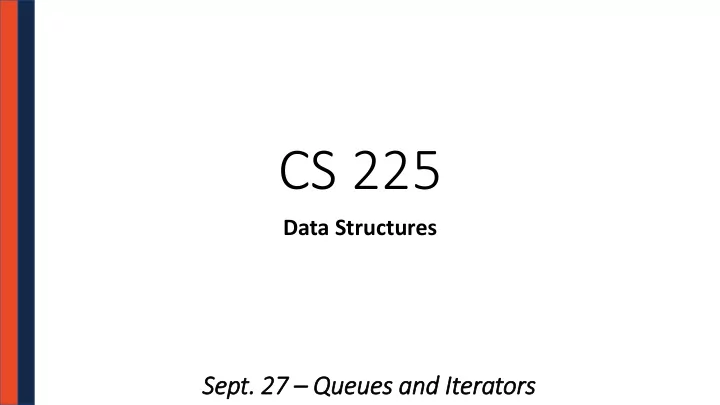

CS 225 Data Structures Sept. 27 – Queues and It Iterators
Queue.h #ifndef QUEUE_H 1 2 #define QUEUE_H 3 4 template <class QE> 5 class Queue { 6 public: 7 8 9 10 11 12 13 14 15 16 17 private: 18 19 20 }; 21 22 #endif
Queue.h #ifndef QUEUE_H 1 What type of implementation is this Queue? 2 #define QUEUE_H 3 4 template <class QE> 5 class Queue { How is the data stored on this Queue? 6 public: 7 void enqueue(QE e); 8 QE dequeue(); 9 bool isEmpty(); Which pointer is “entry” and which pointer is “exit”? Ø 10 8 2 5 11 private: 12 struct QueueNode { 13 QE data; 14 QueueNode *next; 15 QueueNode(QE data) ... {} What is the running time of enqueue()? 16 } 17 QueueNode *entry_, *exit_; 18 int size_; 19 What is the running time of dequeue()? 20 }; 21 22 #endif
Queue.h #ifndef QUEUE_H What type of implementation is this Queue? 1 2 #define QUEUE_H 3 4 template <class QE> 5 class Queue { How is the data stored on this Queue? 6 public: 7 void enqueue(QE e); Queue<int> q; 8 QE dequeue(); q.enqueue(3); 9 bool isEmpty(); q.enqueue(8); 10 q.enqueue(4); 11 private: q.dequeue(); 12 QE *items_; q.enqueue(7); 13 unsigned capacity_; q.dequeue(); 14 unsigned count_; q.dequeue(); 15 16 q.enqueue(2); 17 q.enqueue(1); 18 }; q.enqueue(3); 19 q.enqueue(5); 20 #endif q.dequeue(); 21 q.enqueue(9); 22
Queue.h Queue<char> q; #ifndef QUEUE_H 1 q.enqueue(m); 2 #define QUEUE_H 3 m o n q.enqueue(o); 4 template <class QE> q.enqueue(n); 5 class Queue { … 6 public: q.enqueue(d); 7 Queue(); // … etc … q.enqueue(a); 8 void enqueue(QE e); q.enqueue(y); 9 QE dequeue(); q.enqueue(i); 10 bool isEmpty(); q.enqueue(s); 11 q.dequeue(); 12 private: 13 QE *items_; q.enqueue(h); 14 unsigned capacity_; q.enqueue(a); 15 unsigned count_; 16 unsigned entry_; 17 unsigned exit_; 18 19 }; 20 21 #endif 22
stlList.cpp #include <list> 1 2 #include <string> 3 #include <iostream> 4 5 struct Animal { 6 std::string name, food; 7 bool big; 8 Animal(std::string name = "blob", std::string food = "you", bool big = true) : 9 name(name), food(food), big(big) { /* none */ } 10 } 11 12 int main() { 13 Animal g("giraffe", "leaves", true), p("penguin", "fish", false), b("bear"); 14 std::list<Animal> zoo; 15 16 zoo.push_back(g); 17 zoo.push_back(p); // std ::list’s insertAtEnd 18 zoo.push_back(b); 19 20 for ( std::list<Animal>::iterator it = zoo.begin(); it != zoo.end(); it++ ) { 21 std::cout << (*it).name << " " << (*it).food << std::endl; 22 } 23 24 return 0; 25 }
It Iterators Iterators give client code access to traverse the data! Ø 8 2 5 Operators: Types of iterators:
Iterators encapsulated access to our data: private var ++ * Ø 8 2 5
CS 225 – Things To Be Doing Exam 3 (Theory, C++) finishes today! More Info: https://courses.engr.illinois.edu/cs225/fa2017/exams/ MP3: Available now! Up to +7 extra for submission by Monday, Oct. 2! Lab: lab_quacks start today! Fun lab with one of my favorite debugging techniques! POTD Every Monday-Friday – Worth +1 Extra Credit /problem (up to +40 total)
Recommend
More recommend